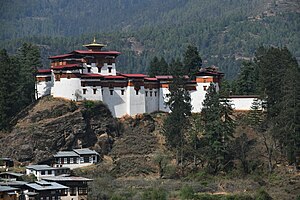Drukgyal Dzong
Place in Paro District, Bhutan From Wikipedia, the free encyclopedia
Drukgyal Dzong (Dzongkha: འབྲུག་རྒྱལ་རྫོང་།), also known as Drukgyel, is a fortress and Buddhist monastery, located in the upper part of the Paro District, Bhutan. [1] The dzong was built by Tenzin Drukdra in 1649 at the behest of Zhabdrung Ngawang Namgyal, to commemorate victory over an invasion from Tibet. Drukdra was the son of a consort of Tenpia Nyima. While ruling as the second Paro Penlop, he named the fortress Drukgyal Dzong, derived from 'The fortress of the victorious Drukpas', Drukpa meaning person of Bhutan. Nearby can be seen the local temple of the people of phangdo, which contains an image of Tara as the main object of worship.[2]
Drugyel Dzong | |
|---|---|
 Drukgyal Dzong after restoration | |
| Coordinates: 27°30′11″N 89°19′21″E | |
| Country | Bhutan |
| District | Paro District |
| Time zone | UTC+6 (BTT) |
In the early 1950s, Drukgyel Dzong was almost completely destroyed by fire. It is listed on Bhutan's tentative list for UNESCO inclusion.[3]
In 2016, to celebrate the birth of The Gyalsey, as well as to commemorate two other significant events, namely, the arrival of Zhabdrung Ngawang Namgyel to Bhutan in 1616 AD and the birth year of Guru Rinpoche, the Prime Minister Lyonchen Tshering Tobgay announced that the Dzong would be rebuilt and reinstated to its former glory. The announcement and ground breaking ceremony took place a day after the Prince was born.[4]
The ruins are comparatively well preserved and how it functioned is still clear. While most of its timber components, such as roof trusses, door and window frames, floors and ceilings, have gone, most of the stone and rammed earth wall structures are still standing. They reveal how the Dzong operated as a defensive fortress in medieval times. [3]
Sacred sites nearby
The Dzong commands a view of many of the sacred sites of Paro, including Jowo Drakegang, Bumo Pundunmagang, the cremation ground of Namgola, the sacred cliff of Chagri Tsen, Draknang Gonpa, Lomochi Gonpa, Gorinang, Tenchen Gonpa, Kichu Lakhang and Santsam Chorten.[2]

References
Glory of Bhutan
Wikiwand - on
Seamless Wikipedia browsing. On steroids.

